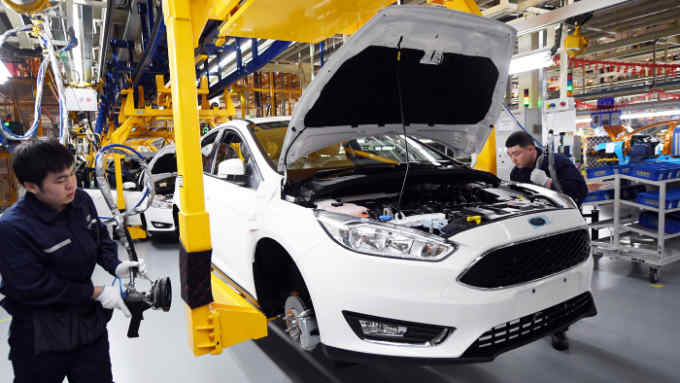Tencent’s losing game with Chinese regulators

Simply sign up to the Chinese business & finance myFT Digest -- delivered directly to your inbox.
Few companies can even dream of the sort of brand awareness enjoyed by Tencent. The Chinese super app is so sewn into the lives of people in China — who use it to work, play, pay and everything in between — that it is hard to last a day without it.
Its messaging app WeChat boasts over 1bn accounts and users on average spend more than a couple of hours a day on it. Big brands from Burberry to Gucci to Starbucks hold official accounts, where users can watch influencers flaunt products, or access flash sales.
Critics query the privacy of using WeChat: earlier this year Li Shufu, chairman of Geely Automobile, opined that Tencent chairman Pony Ma was “definitely looking at our WeChat messages every day”. More recently, however, Tencent found itself facing battle from a hitherto more benign quarter — Beijing.
Having largely facilitated the rise of its tech giants — initially Baidu, Alibaba and Tencent — with a light regulatory touch and effective block on foreign competitors like Facebook, Google and Twitter, Beijing changed its tone in 2017.
Gaming, the cash engine of the $400bn tech conglomerate, suddenly found itself in the line of fire. Far from being a much-loved brand, Tencent’s games came to symbolise everything Beijing was against: addictive, spirit-sapping and even a cause of myopia.
A low point came with a warning carried by the People’s Liberation Army (PLA) Daily newspaper that Tencent’s hit mobile game King of Glory was proving popular among soldiers thereby jeopardising their ability to fight.
“There is certainly a security risk that can’t be overlooked. The game requires constant attention but a soldier’s job is full of uncertainty. Once a soldier is cut-off from the game for an urgent mission, he could be absent-minded during the operation if his mind remains in the game,” the PLA Daily warned.
Worse was to come. Regulators stopped approving commercial licences for online games in late March after media regulation was put under direct Communist party control. That left Tencent and its peers in the unenviable position of being able to publish games, but unable to make money from them.
Since the resumption of approvals at the end of last year, only a few have gone to Tencent — mostly dull, educational games that are not its flag bearers.
Tencent called time on the popular PlayerUnknown’s Battlegrounds mobile game in China after it failed to get approval, instead launching a reworked version named Elite Force for Peace.
PUBG has enjoyed plenty of success, raking in $146m last month to become the world’s top grossing mobile title. $76m came from global app stores, while its Chinese version generated $70m, according to US analytics firm Sensor Tower.
The Peace version — which places the player in training missions for the Chinese military — may have burnished its brand in Beijing’s eyes and brought in plenty of revenue to date, but player numbers are cooling. Daily average users have recently dropped to 56m versus 75m for PUBG, according to HSBC. More to the point: the fact that regulators so readily intervene presents a persistent risk to the company’s plans.
In addition to gaming Tencent, like its peers, wages constant battle over censorship of untoward content, which consists of a broad and constantly changing body of text and images in President Xi Jinping’s China.
For Liz Flora, researcher at Gartner, the strict regulation is a double-edged sword for Tencent and its tech peers. “They must incur large costs to hire moderators and face the prospect of arbitrary, immediate regulations disruptive to their business, including freezes on operations, account purges, takedowns of popular content, or even permanent app shutdowns. The prospect of this is always looming for them.” But she notes that Tencent is well aware of the pitfalls.
Dolce & Gabbana for example sparked controversy and accusations of racism last November when it ran a video on WeChat featuring a Chinese model struggling to eat Italian food using chopsticks, topped with sexual innuendos — the narrators asks, “Is it still too big for you?” — around an oversized cannolo. The social media uproar caused a 2,512 per cent spike in universally negative Weibo conversations about the brand, the cancellation of a multimillion dollar China fashion show, removal from e-commerce platforms, and the loss of all of its Chinese brand ambassadors.
But when it comes to brand recognition, Tencent is taking lessons from its more brand-aware peers overseas. It is ramping up tie-ups with museums and other cultural spots and seeking to take its brands global in a very China-meets-Hollywood way.
Hence alongside the savvy brands like Nike and Coca-Cola appearing in the recent blockbuster animation Spider-Man: Into the Spider-Verse so did QQ, Tencent’s original chat app, one now usurped by younger users — and apparently also the main character Miles Morales, who uses QQ to text his friends.

Comments